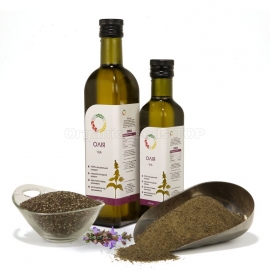 EXCLUSIVE
EXCLUSIVE
Organic Cold-pressed Chia Oil
20.00 €
Chia seed oil boasts a mild taste and offers a multitude of health benefits, which is why foodies and health enthusiasts are increasingly using it to add both creamy texture and nutrients to their culinary creations.
-
Cold-pressed Chia Oil
Chia seed oil boasts a mild taste and offers a multitude of health benefits, which is why foodies and health enthusiasts are increasingly using it to add both creamy texture and nutrients to their culinary creations.
If you are new to using chia oil in cooking, here are a few tips and ideas on how to use this wonderful nutrient-dense oil, as well as an overview of the most important health benefits of chia oil:
The Culinary Uses
If you're not much of a culinary enthusiast but like to take good care of your health, the easiest way to use chia oil is to consume it straight from the spoon. If your taste buds are a bit too demanding for that, here are a few delicious ideas on how you can incorporate this healthy vegetable-based oil into your diet.
Chia oil is an ideal ingredient for healthy salad dressings. Here's a basic recipe for chia-based salad dressing/vinaigrette:
- First, place 1/4 cup of white wine vinegar, 3/4 cup of chia oil, 2 teaspoons of Dijon mustard, 2 tablespoons of chopped fresh herbs, 1/4 teaspoon of salt, and 1 teaspoon of freshly ground black pepper in a canning jar. Then, put the lid on and shake the jar to emulsify the ingredients. And voilà, your chia vinaigrette is ready to be poured over your favorite salad.
- Chia oil makes an excellent health-boosting addition to all types of smoothies, including fruit smoothies and green smoothies. Not only does this wonderful oil have health benefits in its own right, it also helps make the fat-soluble vitamins in smoothies more available to your body. Many smoothie recipes use betacarotene-containing ingredients (such as apricots) and vitamin K packed vegetables (such as spinach), but neither betacarotene nor vitamin K can be absorbed without fat.
- As chia seed oil boasts a neutral flavor, it can be used in almost any recipe without altering the taste of the dish. So, go experimental! Try adding it to oatmeal, yogurt, or cold soups. Just keep in mind that chia oil contains fatty acids that are sensitive to heat, and it is therefore not suitable for pan cooking.
The Health Benefits
Like all vegetable oils, chia oil is calorie-dense (120 calories in one U.S. tablespoon) and can therefore contribute to weight gain when consumed in excess. However, when consumed in moderation, chia oil can offer many health benefits thanks to its attractive nutrient profile: Chia oil contains neither cholesterol nor sodium, and only trace amounts of trans fats. Most of the fats it contains are poly-unsaturated fatty acids (PUFAs), and its dominating PUFA is alpha-linolenic acid.
Alpha-linolenic acid, or ALA, is a type of omega-3 fatty acid that has been shown to exert numerous positive health effects:
- Omega-3 fatty acids are essential for good overall health. They are highly concentrated in the brain and are particularly important for cognitive and behavioral function. A deficiency of these essential fatty acids may show up as poor memory, depression, increased fatigue, poor circulation, or dry and scaly skin. People who don't eat fish (such as people following a vegan diet) have an increased risk of being deficient in omega-3s, and might therefore benefit greatly from adding chia seed oil to their diet.
- A large body of evidence suggests that omega-3 fatty acids can provide protection against cardiovascular diseases. These cardioprotective effects have been linked, among other things, to the ability of omega-3s to prevent blood clots and to reduce inflammation in the artery walls. Note, however, that chia seed oil may not be suitable for people who are taking drugs for cardiovascular problems (or other medication), so be sure to talk to you doctor before adding chia seed oil to your daily diet if you are taking any medication.
- Due to its strong anti-inflammatory properties, chia seed oil is becoming an increasingly popular nutritional supplement among people with joint problems. The omega-3 fatty acids responsible for these anti-inflammatory properties have been shown to both reduce joint pain and improve joint mobility in rheumatoid arthritis patients.
